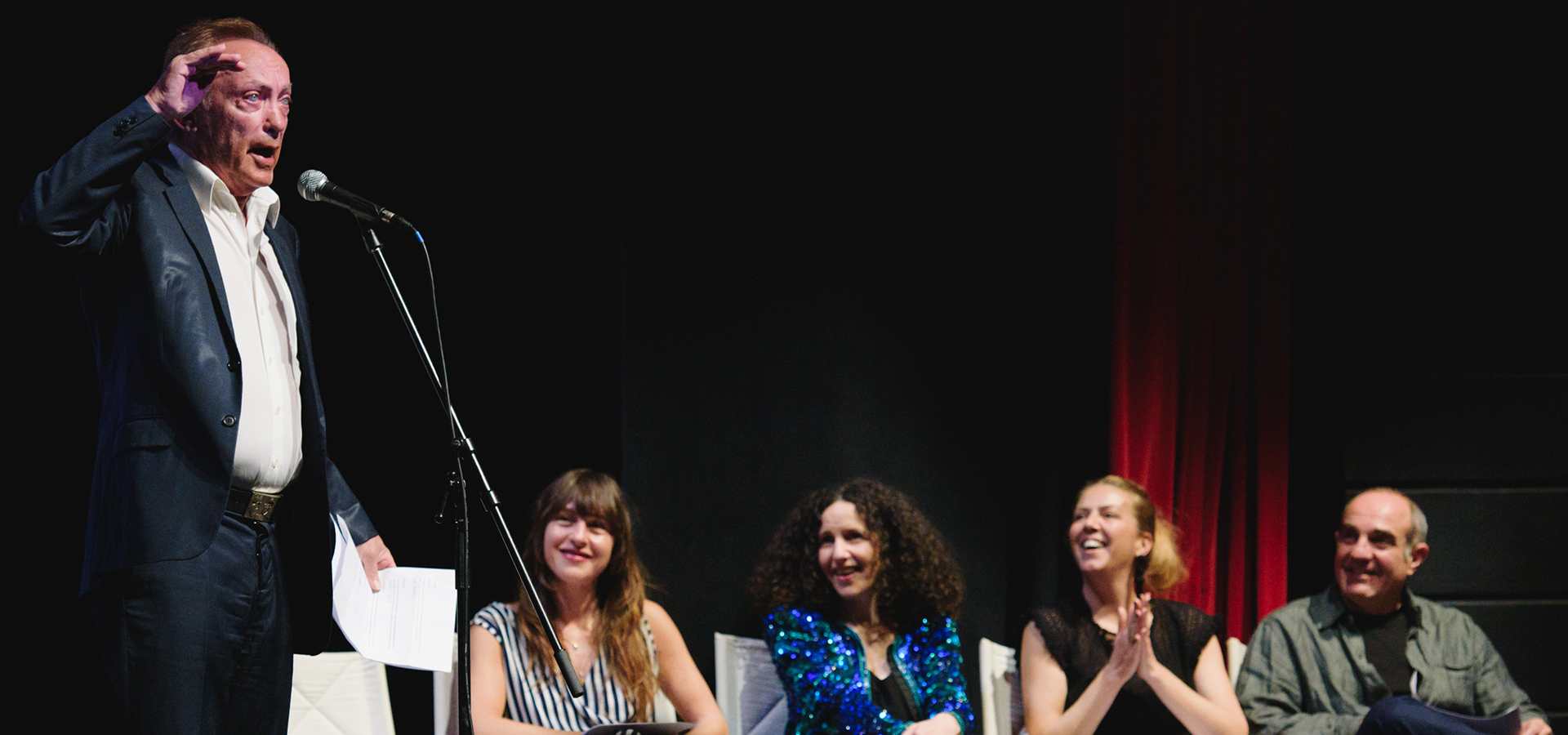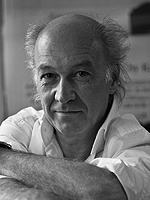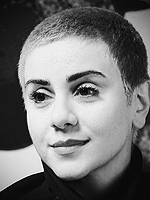
International Jury
The jury of the festival consists of renowned professionals from the International Film Industry. This year, the jury will be headed by Martin Schweighofer, Executive Director of the Austrian Film Commission. Next to him, producers and directors Mania Akbari and Despina Mouzaki will form the jury.
Martin Schweighofer
Executive Director of the Austrian Film Commission (AFC) – the official agency for strategic support and promotion of Austrian cinema abroad.
Studies of journalism and drama at the University of Vienna. Film and theatre critic and arts editor for Austrian periodicals (until 1993). Co-°©‐founder of and dramatic adviser with the theatre company Theater im 2Kopf; Member of various selection boards of film subsidy agencies (Austrian Film Institute etc.);
Founder and director of the film festival Diagonale (1993 -°©‐1996); Founding member of the pan-°©‐European organization European Film Promotion (EFP), currently member of EFP’s Board of Directors and Vice President (since 2013);
Member of the European Film Academy; Jury duties at numerous international film festivals (e.g. Buenos Aires, Copenhagen, Dubai, Thessaloniki, Yerevan
Despina Mouzaki
Producer - Director
Despina Mouzaki is a producer and director of audiovisual works, as well as Associate Professor at the Department of Cinema, Faculty of Fine Arts of the Aristotle University of Thessaloniki, teaching Film Production and Production Direction. She is holder of the following degrees: Degree in Chemistry from the University of Patras, MS in Communication and Cinema from Boston University and Film Finance & Marketing from the Media Business School in Spain. She studied Documentary Filmmaking with Richard Leacock, Jean Rouch and Frederick Wiseman, as well as New Technologies at the MIT Media Lab.
She has been Vice President of the Greek Film Centre (1998-2002) and Director of Thessaloniki International Film Festival (2005-2010). She is the producer/co-producer of renowned films, which have achieved national and international awards, such as Peppermint (1999) by Costas Kapakas, A Touch of Spice (Politiki Kouzina) (2003) by Tassos Boulmetis and Brides (Nyfes) by Pantelis Voulgaris. Among the internationally acclaimed co-productions, the following films are included: My only sunshine (2008) by Reha Erdem, Fugitive Pieces (2007) by Jeremy Podeswa, Borrowed bride (2005) by Atif Yilmaz, O Jerusalem (2006) by Elie Chouraqui, A tout suite (2005) by Benoit Jacquot and Tu Honoreras ta mere et ta mere (2011) by Brigitte Rouan. She is also the producer/co-producer of various awarded documentaries and TV series, such as the documentary Assets (Periousiaka Stihia) (2007), referring to the work of poet Nikiforos Vrettakos and the TV series Olive Tree Routes (Oi Dromoi tis Elias) (2009) for SKAI TV channel and Ten (Deka) (2007), a TV adaptation of M. Karagatsis’s work with the same title for ALPHA TV channel.
Despina Mouzaki is a member of the following film and social organisations: European Film Academy (she was a member of its Administrative Board from 2009 until 2013; since 2013 she has been a member of the Standing Committee for the Best Feature-Length Documentary Annual Award), the International Federation of Film Producers Associations (FIAPF), the Association of Greek Independent Audiovisual Producers (President of the Association from 2002 until 2004), and member of the Plenary Session of the Hellenic National Commission for UNESCO.
Mania Akbari
Director - Actress
Mania Akbari was born in 1974 in Tehran, Iran. The daughter of schoolteachers, she started painting at a very early age. Later she worked as cinematographer and assistant director on documentaries, which reoriented her towards cinema. Her international breakthrough occurred, however, not as a result of her work behind the camera but in front of it. Akbari played a version of herself, together with her son Amin Maher and her sister Roya, in Abbas Kiarostami’s 2002 feature Ten, selected for competition at that year’s edition of the Cannes Film Festival. This was followed in 2003 by Crystal, a documentary about a young Kurdish woman who produces crystal stones from various parts of her body, including her eyes, her throat and her vagina.
Her debut as sole director was in 2004 with 20 Fingers, which she also wrote and starred in. It was awarded Best Film in the Digital Cinema section at the Venice Film Festival and was screened – and won further awards – at more than 40 film festivals internationally. During the next three years, Akbari made Six Video Art works, which not only screened at numerous film festivals such as Locarno, but were also exhibited at museums such as Tate Modern in London.
In 2007, Akbari was diagnosed with breast cancer. The experience of successfully battling the disease prompted her to direct and act in her second fictionalized documentary, 10+4, a sequel to Abbas Kiarostami’s Ten made four years earlier. The new film was exhibited at numerous festivals such as San Sebastián and Cannes, and received numerous awards including Nantes Special Public Award Best Film and Best Director at Kerala Film Festival.
Akbari’s meditations on death, war, family, memory, beauty, relationships and above all, identity, have formed the bases not only of her filmed work but also of a series of photo-based exhibitions that took place between 2007 to 2010 – This is Mania-This is not Mania (2007), This is not Mania-This is not Mandana (2008), Van Gogh’s Ear (2008), Devastation (2009), My Family (2009), My Guernica (2009), To Be Mandana, To Be Not Mandana (2009), Happy Marriage, Mania Akbari & Behnoud Shojaee (2010) – and which toured around the world to countries as various as Switzerland, Slovenia, Brasil, Spain, Italy, UK, France, Dubai and the US.
In 2010, Akbari was back behind the camera making a documentary about the execution of a minor in Iran, called 30 Minutes To 6AM, in which she questions a series of guests on themes such as revenge, justice and pain. She followed this up with her widely acclaimed fiction feature One.Two.One about a young woman dealing with the very slippery concept of beauty after she is disfigured in an accident.
Another decisive moment in Akbari’s life occurred during the filming of her next feature, initially titled Women Do Not Have Breasts. The pronounced toughening of censorship in Iran at that moment meant Akbari was practically forced to leave the country. This prevented the film from being finished. The footage from the abandoned shoot was compiled into a film called From Teheran to London, an unfinished triangular story of love and disenchantment between a young poet, her husband and her maid. The film is accompanied by a making-of documentary, directed by Akbari’s sister, Roya, called Dancing Mania, in which we are shown the intricacies of the various explicit references and comments made throughout the film – for instance, the use of Akbari’s portraits to comment upon beauty, domesticity and sexuality.
Recently Akbari has once again come back to the video art with In My Country, Men Have Breasts (2012), and I slept with my mother, my father, my brother and my sister in a country called Iran (2012) both focusing on the links between family and country and their power in defining ourselves.
Akbari has also just published a book of short stories called The Story Without Découpage. In 2013 she had retrospective in “BFI south bank London”. Now “Mania Akbari” and “Mark cousins” co-directing a long documentary film in London & Edinburg.



